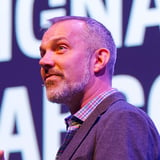Log in or create a free Rosenverse account to watch this video.
Log in Create free account100s of community videos are available to free members. Conference talks are generally available to Gold members.
Summary
Managing others is hard work. Even in the best of times our talent may be restless, anxious, or disengaged. Whether conscious of it or not, people are motivated by opportunities to grow through a sense of purpose in what they do, a sense of autonomy in how they do it, and a sense of achievement for what they get done. When these needs are ignored or the opportunities don’t exist, people management can get even harder. If you struggle at times to engage effectively with your direct reports, or if you want to amplify your ability to support them on their professional journey, taking a coaching approach can help. Coaching is a mutually empowered and collaborative way to guide individual growth. It is fundamentally discovery-driven, not expertise-driven, so “there is no playbook”. Session participants will gain an understanding of how coaching differs from mentoring or advising and explore a set of basic coaching tools for improving communications, results, and accountability with their direct reports. They may also discover that these very skills can also improve engagement with peers and clients.
Key Insights
-
•
Leaders default to fixing or advising rather than inquiring, though inquiry leads to more sustainable change.
-
•
Coaching works because it helps individuals build their own 'mental maps,' aligning change with their internal wiring.
-
•
Neuroscience shows the brain functions best when generating personal connections, making coaching more effective than directive advice.
-
•
The innovation process framework—explore, synthesize, ideate, prototype—applies effectively to leading individual change.
-
•
Clarifying specific behaviors non-judgmentally and verifying perceptions with the other person is foundational for change conversations.
-
•
Open-ended 'what' and 'how' questions invite deeper reflection and discovery compared to closed or leading questions.
-
•
Discomfort in conversations is natural; leaders must cultivate presence and self-management to stay curious rather than reactive.
-
•
Power dynamics affect feedback; developing shared goals and mutual values helps engage even those without direct reporting relationships.
-
•
Regular, ongoing coaching conversations are better than rare, crisis-driven feedback sessions.
-
•
Reflection on iterative attempts and learning from outcomes leverages neuroplasticity to reinforce behavioral changes.
Notable Quotes
"Change doesn’t always need to throw us back on our heels. We can take a proactive approach."
"We tend to do anything but inquire, even though inquiry is most effective for sustainable change."
"Taking a coaching approach supports the other person’s discovery and offers the greatest possibility for change."
"The brain is a connection machine; people need to create their own mental maps to change effectively."
"People tend to support what they actively help create."
"You can’t eliminate judgment; it’s part of human biology, but you can be conscious about it."
"Ask permission before giving feedback, and do it in a timely, private setting for constructive criticism."
"Coaching is not problem-solving; it’s about being curious and inviting discovery."
"Why am I talking? Sometimes it’s better to ask a question and be silent."
"Doing these conversations regularly, not just in crisis, makes a big difference."
Or choose a question:
















More Videos

"Accessibility isn’t a checkbox you run automated tests for; you must involve people with disabilities to benchmark success."
Sam ProulxOnline Shopping: Designing an Accessible Experience
June 7, 2023

"We want to build consultants who can solve problems across a variety of projects and clients."
Ignacio MartinezFair and Effective Designer Evaluation
September 25, 2024

"Transformation is new ways of thinking and eventually doing; we won’t have all the answers at the start and that’s okay."
Sarah Kinkade Mariana Ortiz-ReyesDesign Management Models in the Face of Transformation
June 8, 2022

"The Shaker village sidewalks followed people’s natural inclinations, not forcing unnatural movement."
Daniel GloydWarming the User Experience: Lessons from America's first and most radical human-centered designers
May 9, 2024

"Traditional metrics create a dangerous illusion where we optimize for what we can measure, not what people actually need."
Patrick BoehlerFishing for Real Needs: Reimagining Journalism Needs with AI
June 10, 2025

"With proper prompting, AI can get you really close to a deliverable summary, much closer than expected."
Andy Barraclough Betsy NelsonFrom Costly Complexity to Efficient Insights: Why UX Teams Are Switching To Voxpopme
September 23, 2024

"Technology moves faster than policymaking — that’s the pacing problem we need to address."
Alexandra SchmidtWhy Ethics Can't Save Tech
November 18, 2022

"The greatest sin of the designer is to say I have the answers and no one else is allowed to have them."
Louis RosenfeldDiscussion: What Operations can teach DesignOps
November 6, 2017

"Every decision in a design system is like a puzzle piece; together they form a bigger picture that evolves over time."
Mitchell BernsteinOrganizing Chaos: How IBM is Defining Design Systems with Sketch for an Ever-Changing AI Landscape
September 29, 2021
















